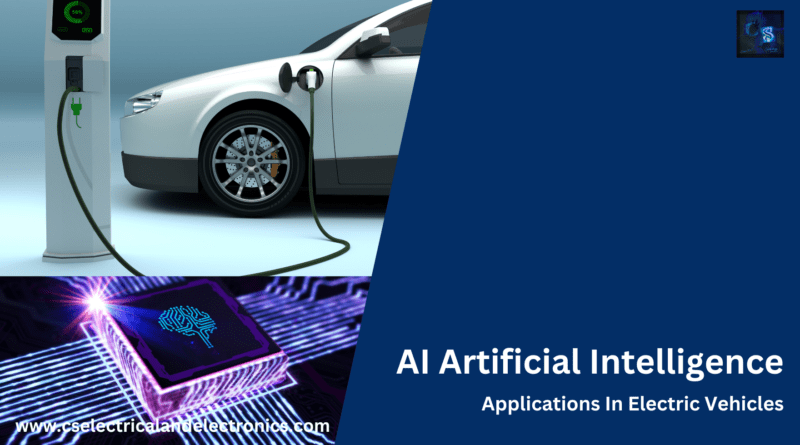AI Artificial Intelligence Applications In Electric Vehicles | Future?
Hello guys, welcome back to our blog. Here in this article, we will discuss the AI artificial intelligence applications in electric vehicles, and how AI can benefit electric vehicles in terms of safety & comfort, and we will also try to share the purpose of each application in electric vehicles.
If you have any electrical, electronics, and computer science doubts, then ask questions. You can also catch me on Instagram – CS Electrical & Electronics.
Also, read the following:
- Introducing The AI Parking Robots, Future Of AI Technology
- Top 25 Technologies That Will Kick Out GPS Technology
- Scientists Develop An AI Model That Can Read The Human Mind
AI Artificial Intelligence Applications In Electric Vehicles
The automobile industry is undergoing a change thanks to artificial intelligence (AI), particularly in the area of electric cars (EVs). AI is being used to improve EVs in a number of ways, including controlling battery performance, enhancing motor control, and enabling autonomous driving. EVs are getting more effective, safe, and user-friendly thanks to AI.
The use of AI in EVs has the ability to significantly improve energy efficiency, increase driving range, and offer a personalized and intelligent driving experience, which has the potential to revolutionize transportation. As AI develops, it is anticipated to have a big impact on how electric vehicles are developed in the future, making them an essential part of smart and sustainable transportation networks.
10 Artificial Intelligence Applications In Electric Vehicles
01. Motor control using AI:
The analysis of real-time data from sensors, including speed sensors, throttle position sensors, and motor temperature sensors, is a key component of AI motor control optimization. AI algorithms can instantly change the torque, speed, and other motor control parameters by continuously monitoring these variables. This optimization results in quicker acceleration, better energy efficiency overall, and smoother operation of the electric motor in an EV.
02. Battery management system:
The battery in an EV is monitored and managed via the battery management system (BMS). AI is essential for improving the BMS. AI algorithms can optimize the battery’s charging and discharging cycles by gathering and examining data on the temperature, voltage, current, state of charge, and other pertinent elements. This improvement maximizes energy efficiency, increases battery lifespan, and ensures that the battery runs within safe parameters.
03. Range prediction:
In EVs, range prediction is a crucial function because it aids in efficient trip planning. To estimate an EV’s remaining range, AI algorithms examine a variety of data sources, including past driving habits, environmental factors, the terrain, and real-time energy use. AI can accurately anticipate how far a driver can go before needing to recharge by taking these aspects into account. Better route planning is made possible by this knowledge, which also lowers the possibility of unexpected battery drain.
04. Charging infrastructure optimization:
Analysis of data regarding charging station locations, usage trends, electricity demand, and other pertinent parameters is required for optimizing the charging infrastructure. These data can be processed by AI systems to decide where and how many charging stations should be placed. AI may make sure that charging stations are conveniently positioned and suitably furnished to fulfill the needs of EV users by recognizing regions with a high EV density or high power consumption. Through this optimization, charging times are shortened, anxiety over the range is reduced, and EV adoption is encouraged.
05. In-Car Experience and Personalization:
For EV drivers, AI can personalize their in-car experience. AI systems can modify a number of settings, including seat position, climate control, entertainment selections, and even driving modes, by learning the preferences and behavior of the driver. For instance, based on unique driver profiles, AI can automatically modify the temperature, seat position, and favorite music selections. This customization improves comfort and convenience, which improves the enjoyment of driving.
06. Vehicle-to-Grid (V2G) integration:
Bidirectional energy flow is made possible via V2G integration, which enables EV interaction with the power grid. AI algorithms are essential for effectively controlling this energy flow. EVs can use the grid to charge as well as to return extra energy to it as necessary when they are connected to it. By taking into account variables like electricity demand, grid stability, and EV owner preferences, AI optimizes this energy exchange. This connection helps the power grid, which can use EVs as distributed energy storage devices, as well as EV owners, who can profit from selling extra energy.
07. Personalized energy consumption feedback:
Personalized input on EV drivers’ energy use habits from AI is possible. AI systems can pinpoint places where drivers may increase vehicle efficiency by analyzing data on driving behavior, charging patterns, and energy usage. AI, for instance, might recommend driving strategies, such as smoother acceleration and braking, or it can optimize charging times to benefit from lower power rates. Drivers are given the information they need to optimize their energy use, which improves efficiency and extends the range of their vehicles.
08. Autonomous driving:
In order to make EVs capable of autonomous driving, AI is essential. To understand the environment of the vehicle, AI systems examine sensor data from cameras, radars, LiDAR, and other sources. AI enables the EV to make deft decisions without human intervention by recognizing objects, detecting lane lines, and examining traffic patterns. This covers activities like lane changes, passing, and negotiating tricky road conditions. Improved safety, lessened driver fatigue, and new opportunities for effective transportation systems are among the benefits of autonomous driving.
09. Enhanced safety features:
AI improves EV safety through a variety of applications. In order to identify potential dangers like pedestrians, vehicles, or barriers on the road, AI algorithms analyze sensor data from cameras, radars, and other sources. AI can warn the driver or even take over the steering to stop accidents by constantly monitoring the environment. AI systems can also keep an eye on a driver’s behavior, looking for signs of exhaustion, distraction, or impairment and sending out alerts as needed. EVs are safer for both drivers and pedestrians thanks to these improved safety features, which reduce dangers.
10. Energy efficiency optimization:
AI algorithms may analyze real-time data from numerous systems and components to optimize energy use in EVs. For instance, AI can modify the HVAC system based on current temperature and occupancy data or optimize the motor control to cut down on energy losses. AI makes sure that energy is used effectively, increasing the EV’s range by continuously monitoring and modifying key factors. Optimization of energy efficiency is essential for raising the general sustainability and usefulness of EVs.
Conclusion
Finally, the incorporation of artificial intelligence (AI) into electric cars (EVs) has the potential to completely transform the automotive sector. The performance, effectiveness, and practicality of electric vehicles are improved through AI applications in EVs such as motor control optimization, battery management, range prediction, and charging infrastructure optimization. EVs can function more effectively, increase their range, and give drivers a customized and knowledgeable driving experience by utilizing AI algorithms and data analysis.
AI’s capacity to enhance EV motor control results in increased effectiveness and performance. AI algorithms make sure that the electric motor performs at its peak efficiency, resulting in greater energy usage and overall vehicle performance by altering parameters like torque and speed based on real-time sensor data. Additionally, AI-based battery management technologies assist EV batteries in last longer, operating safely, and maximizing their efficiency. Artificial intelligence (AI) algorithms keep track of battery characteristics, optimize charging and discharging cycles, and guard against dangers, extending the dependability and life of EV batteries.
A key feature of EVs is the precise forecast of driving range, and AI is important in attaining this. To precisely anticipate an EV’s remaining range, AI systems examine a variety of data sources, including energy use, driving habits, and environmental factors. With the use of this knowledge, drivers may efficiently plan their trips, reduce range anxiety, and designate the best routes for charging and travel. Furthermore, AI-powered optimization of the charging infrastructure makes sure that charging stations are strategically situated, taking into account elements like EV density and electricity demand. The convenience and usability of EVs for drivers are improved by this optimization, which increases the accessibility and availability of charging stations.
Additionally, AI enhances the in-car experience and personalizes EVs. AI algorithms can customize a variety of in-car settings, including seat placements, climate control, and entertainment selections, by learning about the preferences and driving style of the driver. This customization improves driver comfort and convenience, resulting in a more comfortable driving experience that is catered to personal preferences. AI also makes it possible for vehicle-to-grid (V2G) integration, which permits two-way energy flow between EVs and the power grid. Due to this integration, EVs can function as energy storage devices and aid in the stabilization of the grid, the use of renewable energy sources, and the reduction of energy costs.
In conclusion, the use of AI in electric vehicles has broad ramifications. AI applications improve the functionality, effectiveness, and usefulness of EVs in a variety of ways, from improved motor control and battery management to precise range prediction and individualized experiences. We may anticipate even more cutting-edge uses and advancements in autonomous driving, energy efficiency, and safety as AI keeps developing. Electric vehicles are positioned to take the lead in the development of intelligent and sustainable transportation in the future.
This was about “AI Artificial Intelligence Applications In Electric Vehicles“. I hope this article may help you all a lot. Thank you for reading.
Also, read:
- 100 (AI) Artificial Intelligence Applications In The Automotive Industry
- 6G Technology: What To Expect Beyond 5G
- Advancements In 3D Printing Technology And It’s Future
- Advancements In Power Electronics For Energy Efficiency
- AI Artificial Intelligence Applications In Electric Vehicles | Future?
- AI Tools For Electronic Circuit Design, Which Is Best?
- Applications Of Artificial Intelligence (AI) In Renewable Energy
- Autonomous Vehicle, Benefit, Drawback, Purpose Of Autonomous Vehicle
Author Profile
- Chetu
- Interest's ~ Engineering | Entrepreneurship | Politics | History | Travelling | Content Writing | Technology | Cooking
Latest entries
 All PostsApril 19, 2024What Is Vector CANoe Tool, Why It Is Used In The Automotive Industry
All PostsApril 19, 2024What Is Vector CANoe Tool, Why It Is Used In The Automotive Industry All PostsApril 13, 2024What Is TCM, Transmission Control Module, Working, Purpose,
All PostsApril 13, 2024What Is TCM, Transmission Control Module, Working, Purpose, All PostsApril 12, 2024Top 100 HiL hardware in loop Interview Questions With Answers For Engineers
All PostsApril 12, 2024Top 100 HiL hardware in loop Interview Questions With Answers For Engineers All PostsMarch 22, 2024Driver Monitoring Systems In Vehicles, Working, Driver Sleepy Alert
All PostsMarch 22, 2024Driver Monitoring Systems In Vehicles, Working, Driver Sleepy Alert








